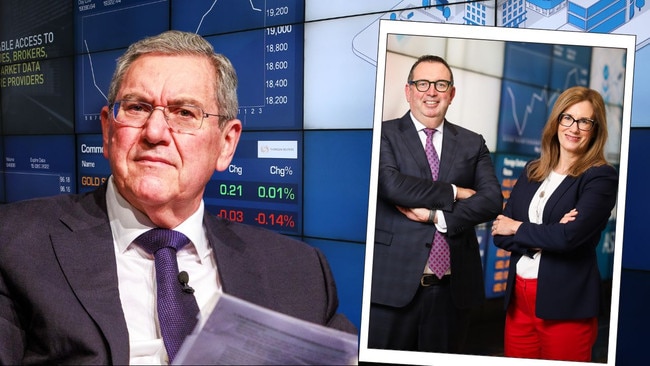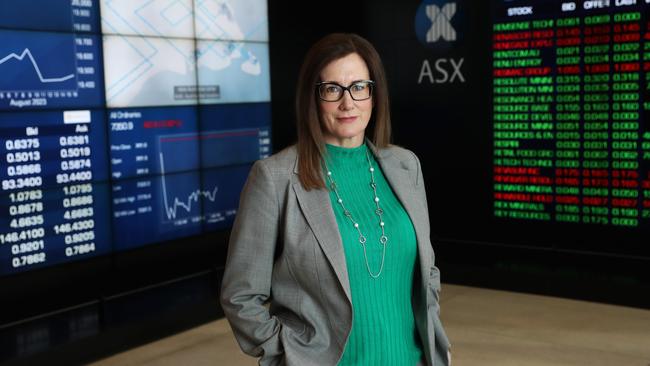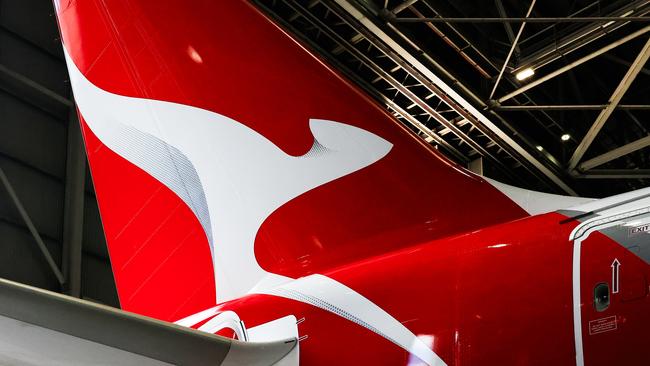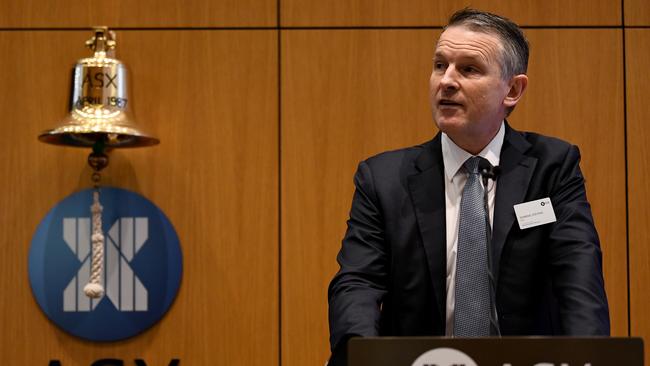ASX brings back bonuses for board and executives as it ignores CHESS crisis
ASX’s chairman got $550,000, its now CEO got $3.8m and others such as the chief risk and finance officers were paid as though the unfolding train wreck is nothing more than a technical glitch.

Business
Don't miss out on the headlines from Business. Followed categories will be added to My News.
The ASX has chosen to ignore the lessons of a defining crisis, after other companies from Qantas, Commonwealth Bank and even Rio Tinto were punished and learned when they went through their own reputational hits.
ASIC’s landmark legal action filed this week conduct demanded the ASX take collective responsibility for allegedly misleading investors in early 2022. So far it’s only landed on two – the former CEO and former deputy chief executive.
ASIC and other regulators were incensed over how badly the CHESS replacement program when off the rails and according to the claims in the legal filing, ASX was actively hiding the bad news. ASX’s chief executive Helen Lofthouse has said the market operator takes the allegations seriously and is reviewing the legal action.

For its part, ASX thinks it has put the sorry and costly episode of its CHESS replacement behind it as it works with a new tech partner in trying to bring in a clearing and settlement platform beyond 2027.
The exchange views the events of the past few years including the disruption on stockbrokers, banks and investors as mere operational mistake, not a governance failure.
The ASX previously has singled out former CEO Dominic Stevens and his former deputy Peter Hiom for the mess – but the board doesn’t seem to grasp the scale of the governance problems stemming from the ASIC legal action.
The ASX likes to remind us it is the operator of a critical market infrastructure, this puts it in a unique position. And markets supervisor and the author of the Corporate Governance principals for thousands of companies listed on its board, it goes without saying ASX’s standards need to be of the highest order.
Based on its actions in the aftermath of the CHESS train wreck, it is arguable this is not the case.
Even after getting such a severe and rare public dressing down from the Reserve Bank when its CHESS program was shelved in late 2022, there hasn’t been any visible introspection from the ASX beyond last year’s technical review of the status of the CHESS program it had commissioned from consultancy Accenture.
The RBA ordered an external review on how ASX manages its conflicts between its commercial and its licence obligations of running clearing and settlement. The Herbert Smith Freehills report made 13 recommendations for governance changes.
The ASIC investigation around potentially misleading investors has been underway since March last year and beyond acknowledgment of the serious nature of the allegations there’s been little other response.
In Rio Tinto’s Juukan Gorge caves crisis, there were internal and external reviews including assessment of whether there was a culture of good news travelling up and bad news being pushed down. Rio’s entire board underwent a rebuild.
In Qantas’ case after a string of reputational hits the board launched an external review that put its actions under the microscope. It called out a continued failure of the airline’s directors to challenge management.
At the same time, all of Qantas’ executives had their bonus payments stripped or heavily docked and former chief executive Alan Joyce losing more than $9m.
Woolworths too has its moment of introspection after trying to push through a controversial Dan Murphy’s development in a vulnerable Darwin suburb, and accepted it too needed a reality check with an independent review of its processes.

A separate incident at Woolworths, a death of a contractor at one of its sites last year saw all senior management immediately docked of pay even before an investigation into the accident was finalised.
Even earlier in 2018 Commonwealth Bank’s former chair Catherine Livingstone dished out the harshest of medicine, demanding collective accountability from that bank’s entire management team for its Austrac anti-money laundering scandal.
She stripped all bonus payments no matter how far away the individual executive was from the Austrac anti-money laundering scandal. CBA’s lower management ranks also felt the financial hit. Punishing internal and external reviews were commissions.
Last year, the ASX board cancelled around $3m in long-term bonus payments and share rights of former boss Stevens. In the year before Stevens was paid nearly $5m, including $3m in short-term bonus payments. Hiom was also stripped of his long term payments but kept previous payments.

The two were called out as having direct responsibility for the project that ultimately cost $255m in writedowns and put ASX’s technology decades behind global rivals.
In 2023, the ASX’s board also made the call to cut the short term bonus pool in half for all top executives. This made it still possible for some executives, to receive up to a 90 per cent bonus, albeit from a smaller pool. Lofthouse, the former markets boss who took charge two years ago, was given short term cash bonus, equivalent to $1m. (Some of this was deferred under an existing policy).
For ASX, that seems to be where the matter ends.
But there could be more heavy costs to come. The ASIC action, if proven, could result in a heavy financial penalty given ASX’s unique position as a markets operator.
However, beyond actions against Stevens and Hiom, management continues to be paid this year as though nothing has happened and beyond several new directors there’s been no obvious overhaul of processes or governance.
The ASX board led by chair Damian Roche, who was chairman at the time of the alleged wrongdoing took place, was paid $550,000 in cash in each of the last two years, according to the annual report released early Friday.
Other board members at the time also continued to collect their fees. Lofthouse was last financial year paid $3.84m, including bonuses, others including the chief risk officer and former long-serving chief financial officer who left last year were also paid as though nothing had happened.
It’s a new year for ASX, bonuses are back and there’s little evidence the board is prepared to use the crisis to become a better company.
–
Consumers fight back
If corporate Australia were to nominate a new hero it should be the Aussie consumer.
A major theme coming out of week two of earnings season has been the resilience of Australian households in the face of the surge in interest rates.
Names like JB Hi-Fi, Commonwealth Bank, Origin Energy and even Telstra all found earnings support as consumers simply refuse to give up. A stable interest rate outlook and relatively low unemployment is helping, although many bosses were cautious about further and real pain if interest rates moved any higher.
When it comes to consumers, JB Hi-Fi was the standout. Sales momentum in the June half year and better-than-expected numbers into July sent the electronic goods retailer’s shares to a record of more than $77 this week.
Chief executive Terry Smart says the jury is still out whether consumers are spending or saving their tax cuts but, from his position, customers are spending in a more discerning way.
“They’re still buying and what we are seeing is they’re reacting much more strongly to promotional events. Consumers are really driving to find the best value for their money,” Smart tells The Weekend Australian.
Sales at JB Hi-Fi’s flagship brand were up 1 per cent on the year, although The Good Guys brand that specialises in whitegoods cooled over the year.
Telstra’s key mobile business continues to gain ground and chief executive Vicki Brady says the consumer-facing side of Telstra continues to be resilient, although historically the swings in the economy don’t have a big correlation with how it performs. So far there haven’t been signs of a lift in bad debts or cancellations. That reflects customers prioritising communications as a necessity, Brady says in an interview.
Where the slowdown is more noticeable is among business. “We’ve definitely seen business confidence play a part by pulling back on what they would consider more discretionary spending,” Brady says.
For Commonwealth Bank boss Matt Comyn, he has the numbers to prove many are doing it tough – particularly those in their late 20s and into their 40s who are either renting or have taken on a new mortgage and are trying to manage rising costs. Spending among those has been cut back.
“That’s the pecunious effects of inflation. It impacts everyone, but it particularly impacts those lower incomes,” Comyn tells The Weekend Australian.
Still, the bank is seeing those into their 50s and older are net savers, and higher interest rates mean more disposable income.
And while CBA saw a small lift in the number of stressed loans, arrears are unusually low for this deep into a steep rate-hiking cycle, particularly among households. That shows the resilience is there.
Comyn is worried about small business being vulnerable as the economy slows. He tips that the next six months will be tough for many, but as interest rates come down in 2025 and into 2026 this should spur on a rebound in spending.
Energy boss Frank Calabria of Origin is acutely aware his business sits at the sharp end of rising costs. Electricity prices are soaring and, as an energy retailer and generator, Origin’s customers are feeling this. Calabria last year set aside $50m to cover hardship cases. He expects to put aside the same amount this year, even as power prices start coming off.
He has noticed, too, that his customers are changing their behaviour by using more time-of-day pricing or cutting back at the margins in some areas.
“We are very, very aware of cost-of-living pressures Australians and many Origin customers are facing,” Calabria says.
johnstone@theaustralian.com.au
More Coverage
Originally published as ASX brings back bonuses for board and executives as it ignores CHESS crisis





